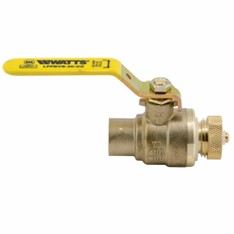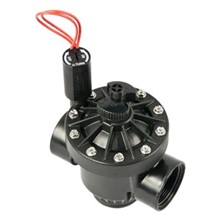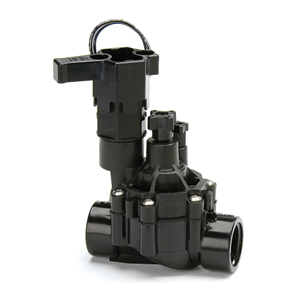Your Complete Guide to Irrigation Valves
When it comes to making sure your crops, grass, or landscape receive the right amount of water at the right time, the quality of your irrigation system is crucial. One of the most important components of any irrigation system is the irrigation valve. If you choose the wrong type of valve, it can have a disastrous effect on your results, whereas the right valve will help you meet your growing goals. Whether you’re a farmer growing crops, a landscaper nurturing lush gardens, or a commercial landscaper managing large green spaces, this guide will help you navigate the world of irrigation valves.
What Are Irrigation Valves?
Irrigation valves are mechanical devices that control the flow of water through an irrigation system. They open and close to either allow water to pass through or to stop the flow entirely. The most common types are manual valves and automatic valves. As the name suggests, manual valves require someone to physically open or close them, while automatic valves operate based on a timer or a control system. These valves help you maintain the right water levels and distribution so that the different zones of your landscape or farm receive the appropriate amount of water.
Why Are Irrigation Valves Important?
Irrigation valves are important for a handful of reasons. Without proper valves, you risk overwatering or underwatering your plants, which can lead to poor growth, wasted water, and increased costs. But when you take the time to select the correct irrigation valves for your specific needs, you can optimize your water usage, reduce waste, and ultimately support the health and productivity of your plants.
Different Types of Irrigation Valves
Choosing the right irrigation valve depends on various factors, including the size of your irrigation system, the type of plants you’re watering, and your control preferences. Below are some common irrigation valve types and their applications:
Gate Valves
Gate valves are typically used in large-scale irrigation systems. They work by lifting a gate to allow water to flow through. These valves are ideal for applications where you need to stop or start the flow of water completely. However, they are not suitable for regulating flow, as they are either fully open or fully closed.

Ball Valves
Ball valves use a rotating ball with a hole through the middle. When the hole is aligned with the flow, water passes through; when rotated, the flow stops. These valves are easy to operate and provide a reliable seal, making them a popular choice for both residential and commercial irrigation systems.

Solenoid Valves
Solenoid valves are electrically controlled and are a key component in automatic irrigation systems. These valves are operated by an electric current that opens or closes the valve, which allows for precise control over water distribution. Solenoid valves are perfect for farmers and landscapers who require automation and the ability to program specific watering schedules.

Check Valves
Check valves allow water to flow in one direction only, preventing backflow. These are essential in systems where contamination of water sources must be avoided. For instance, in agricultural settings, check valves are used to ensure that fertilizers or pesticides do not flow back into the main water supply.
Electric Valve
Electric valves are widely trusted in landscaping. Examples of an electric valve include the diaphragm valve (DV valve) from Rain Bird and the PGV (professional grade valve) valve from Hunter. These valves offer exceptional reliability and are some of the top choices for professionals. Known for their durability, electric valves feature a double-filtered pilot flow design to prevent clogging, making them ideal for larger residential applications. Additionally, their IVM-SOL compatibility allows for advanced control and diagnostics. With over two decades of proven performance, the DV/DVF Series of electric valves is particularly suitable for low-flow and drip irrigation systems, providing precision and resilience in various environments.


How to Choose the Right Irrigation Valve
Selecting the appropriate irrigation valve depends on several factors, including your specific application, the size of your irrigation system, and your control needs. Here are some considerations to help you make an informed decision:
System Size and Complexity
For larger systems, such as those used in farming or commercial landscaping, you might need multiple valve types to manage different zones effectively. In such cases, automatic valves like solenoid valves could be more efficient, as they allow you to control multiple zones from a single point.
Control Preferences
If you prefer a hands-on approach, manual valves like gate or ball valves might be suitable. On the other hand, if you’re looking for a more automated system that requires minimal manual intervention, solenoid valves are an excellent choice.
Water Pressure Requirements
For systems that require precise control over water pressure, globe valves are often the best option. These valves allow you to adjust the flow, which can be crucial for plants that require specific watering conditions.
Preventing Backflow
If your system involves the use of fertilizers or chemicals, check valves are essential to prevent contamination of your water supply. These valves are particularly important in agricultural settings where maintaining clean water sources is critical.
Using Irrigation Valves in Different Applications
For Farmers
Farmers typically deal with large irrigation systems that require reliable and durable valves. Solenoid valves are often preferred because of their automation capabilities, allowing for precise watering schedules that can be adjusted based on the crop type and weather conditions.
For Landscapers
Contractors, particularly those working on residential projects, might opt for manual valves like ball or gate valves. These valves offer simplicity and are easy to operate, making them ideal for smaller-scale irrigation setups.
For Commercial Landscapers
Commercial landscapers often manage extensive systems with varying water needs across different zones. Electric and gate valves are frequently used in these applications, providing both control and automation to ensure each area receives the appropriate amount of water.
Choosing the right irrigation valve is a must for the efficiency and effectiveness of your irrigation system. Whether you’re a farmer, landscaper, or commercial landscaper, understanding the different irrigation valve types and how they can be applied will help you make informed decisions for your specific needs.
Contact Vanden Bussche Irrigation to learn more about how to implement proper irrigation system setup and maintenance!

